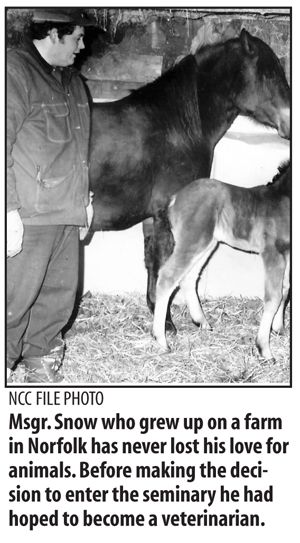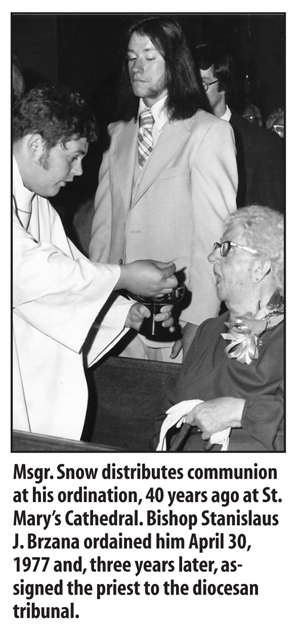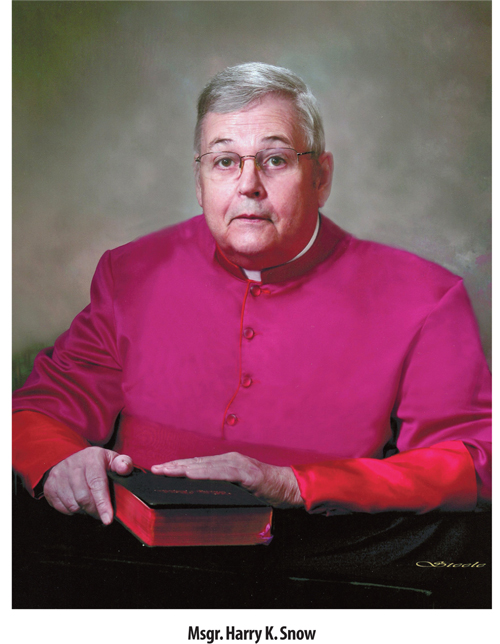Aug. 16, 2017 By Mary Lou Kilian Ogdensburg – Young Harry Snow dreamed of becoming a veterinarian while growing up in a Norfolk farm family. But his hopes to spend his life caring for animals took a turn as he listened to the voices of the priests who staffed Norfolk’s Church of the Visitation parish. “Father Francis J. Connors asked me to become an altar server right after I made my first communion,” Msgr. Snow said. “Father Denesha, who taught high school religion, and Father George Lemieux also made a big impression on me. “Father Lemieux was a soft spoken, gentle person who talked about the seminary and encouraged me to apply,” he said. Msgr. Snow also pointed to the influence of his family in the growth of his vocation to the priesthood. “My mother was very involved in the church and taught religious education for 30 years,” he said. “So we knew our catechism.” Ultimately, the high school student decided the seminary rather than veterinary school was the place for him. I would say it’s the most pastoral ministry in the diocese because we are working with people who are hurting, who would like to be engaged fully in the life of the church He entered Wadhams Hall Seminary College and completed studies for the priesthood at Christ the King Seminary before his ordination April 30, 1977. As Msgr. Snow celebrates his 40th anniversary as a priest for the Diocese of Ogdensburg, he talked with the North Country Catholic about his life of ministry under five bishops – Bishop Stanislaus J. Brzana, who ordained him, and Bishops Paul S. Loverde, Gerald M. Barbarito, Robert J. Cunningham and Terry R. LaValley. In particular, Msgr. Snow reflected on his work in the diocesan Matrimonial Tribunal and Office of Canonical Affairs where he spent 37 of his 40 years of priesthood. In the tribunal At that time, Father Douglas Lucia succeeded Msgr. Snow as judicial vicar. In the Catholic Church, each diocese is required to have a tribunal - the court of the church - and required to have a judicial vicar to lead it. The Code of Canon Law spells out the structure, procedures and jurisdiction. Most of the cases involve requests for marriage annulments. “The role of tribunal is to be there to protect the rights of individuals, safeguard the teachings of the church, to assure the proper functioning and good order in the diocese,” Msgr. Snow said. “A bishop cannot act arbitrarily; he needs to observe the norms of the universal church and the local church.” The early years The new Code of Canon Law was promulgated in 1983, under Pope John Paul II. During his early years in the office, with Father Edward Wright as judicial vicar, Msgr. Snow served as secretary of tribunal, defender of the bond and advocate. This means he put together the cases along with whoever submitted it, usually the pastor or parish priest. “Sometimes I would conduct interviews making sure I had all the documentation,” he said. “I would follow the case from the day it was opened straight through to the final resolution.” Msgr. Snow also took time to travel to parishes around the North Country as he was invited to present workshops on annulments, explaining the meaning of an annulment and the process that was observed. Msgr. Snow gives much of the credit for his appointment in the diocesan tribunal to Father Wright. “When I was a young priest, Father Wright would call me and say ‘Harry, I have people to be interviewed as witnesses in an annulment in the Brasher, North Lawrence region, would you be willing to interview them?’ and then he would send the questions, names and addresses,” he said. “I started going out and interviewing people. “Then he asked if I would write up reports for him,” Msgr. Snow said. “When I went to Lowville, I continued to do the same and I got so that I enjoyed it.” “I never had the expectation that I would work in any diocesan office, let alone the tribunal,” he said. “I just figured I would be a typical parish priest.” Back to school He spent a semester at Catholic University of America, and then transferred to St. Paul’s University in Ottawa. Msgr. Snow noted that many faculty members at St. Paul’s came from Europe to teach for a semester. “Some were professors from universities in Rome so they had first-hand knowledge on what the new Code of Canon Law was about,” Msgr. Snow said. “Some had actually worked on the revision of the code. “Father Francis Morrissey, an Oblate priest, long time professor and dean of canon law at St. Paul’s, was one of the principal English consultants with the code,” he said. “He went all over the world, meeting with bishops’ conferences to explain the new code.” Msgr. Snow completed his studies in 1985 and returned to full time ministry as pastor in Morristown along with his work in the tribunal. In 1988, he succeeded Father Wright as judicial vicar. From bishop to bishop This is so, said Msgr. Snow “because the work of the tribunal is to assist the diocesan administrator, protecting rights of Christian faithful and to assure the good running and operation of the diocese. “If a tribunal ceased, rights of people could not be vindicated such as declarations of annulity,” he said. “People have a right to have their cases heard. “In rare cases, judicial vicars have been able to avoid abuse of power by different groups within the diocese,” Msgr. Snow said. “When there’s a sede vacante, (a vacant see or diocese without a bishop) the administrator of the diocese cannot make changes that would impact the role of the successor bishop. Ministry of healing “They present their petition to the official church court and ask that it be looked into,” he said. “They ask ‘is there a possibility of an annulment so that I can have a new marriage in the Catholic church and be able to receive the sacraments?’” “When you see the healing, the pastoral sensitivity of the tribunal you know it’s a ministry of healing,” he said, “a service to the well-being of souls. “I get letters at Christmas time - years after an annulment was granted - saying ‘I just want you to know that I’m a proud grandparent and was so pleased that I was able to go to communion when my grandchild made his first communion,’” he said. The challenges “Even in some of those cases, I’ve had people say, ‘at least I’ve had a chance to have my case formally heard before the church,’” he said. “Some people would say that ‘I didn’t think there were grounds but I heard your philosophy when you gave a talk, ‘nothing ventured, nothing gained,’” Msgr. Snow said. “And that’s what I’ve always said ‘nothing ventured, nothing gained.’” Another frustration Msgr. Snow experienced through the years has been the need to “correct misinformation that’s out there.” “It’s difficult to travel to different parts of the diocese and hear from people that ‘the priest who was here years ago said an annulment would cost you too much’ or ‘you were married too long before your divorce so there’s no way it would go through,’” he said. “I’ve been discouraged by what so many people have lived with because of misinformation given by parish priests or deacons,” he said. “Or people hearing from their neighbor ‘give up. It’s all who you know and, if you’re one of the insiders you’re going to get it.’” “Those kinds of things hurt,” Msgr. Snow said. “When Sister Mary Ellen (Brett, former director of evangelization) was running the Come Home program, she would invite me to give talks on annulments and it was amazing what subjects would come up,” he said. “But it was because of people like Sister Mary Ellen and some of our pastors who invited me to come that I was able to clear up some of these things,” he said, “still it was hard to break through. Over all, though, “there has been much more happiness than frustration,” said Msgr. Snow. A (not-so-typical) parish priest After his service as pastor in Morristown, he was named rector for St. Mary’s Cathedral, adminstrator in Norwood, and, most recently, pastor in Madrid and Waddington, while continuing his work in the tribunal. “I think I’ve been more sensitive when somebody talks about troubles in a marriage,” he said. “We can’t be flippant when somebody is hurting.” “It has also helped me to prepare couples for marriage,” he said. “I’ve actually had two couples change their minds when I was able to show evidence of emotional abuse in the relationship. “If you’re going to be a pastor, you’ll be with people who face terminal illness or a broken marriage,” he said. “You have to be able to put yourself out to serve them.” As he moves into retirement, Msgr. Snow holds on to his love for canon law, finding enjoyment in reading canon law journals. He cited a particular canon - #1752 – as guidance for his own life as a priest: • The current moderator, Elaine Seymour, has done a great deal in terms of getting old cases scanned for permanent records and using technology to keep everything current. The moderators are very important because they follow a case from very beginning to conclusion • Then you have word processing office, in terms of the hours the staff spends transcribing and writing letters • We have psychologists and social workers who read over all the cases that involve psychological grounds. The person I remember with great joy is Gerald Erwin, a masters of social work and head of a department at the psych center who used his expertise with the social sciences to discern what was going on in the life of this couple when they married. Our current assessor is a doctor in psychology who’s also head of department at the psych center, Dr. Kurt Halladay. PhD. He is excellent in terms of giving us insights in human dimensions that involve decision making processes. • Each case needs to be referred to defenders of the bond and these are priests who, as well as serving as pastors, take time to read the cases and either argue in defense of the bond of marriage or say there’s no bond to defend. We’re lucky, we have a new defender, a lay woman who lives in the Plattsburgh area, Catherine Friederichs. She brings a number of skills because of her work in canon law at St. Pauls’ in Ottawa and as member of the tribunal staff in the Archdiocese of Montreal. She also does interviews for me and does it all free of charge. • Also, we have judges who make final decisions. Under the 1983 code, cases no longer need to be judged by three judges; they can be judged by one. Bishop Loverde was very supportive of that and gave permission for the Ogdensburg tribunal to judge with one judge. Of our judges, the longest serving judge is Father Phillip Allen, who serves as adjutant judicial vicar, vice officialis but he was judicial vicar before Father Ed Wright. Father Allen has been very gracious in serving all these years. |
||||

 The eldest of three children, he had a great love for animals and raised cattle and draft horses.
The eldest of three children, he had a great love for animals and raised cattle and draft horses.

